Related Research Articles

The monarchy of Canada is Canada's form of government embodied by the Canadian sovereign and head of state. It is one of the key components of Canadian sovereignty and sits at the core of Canada's constitutional federal structure and Westminster-style parliamentary democracy. The monarchy is the foundation of the executive (King-in-Council), legislative (King-in-Parliament), and judicial (King-on-the-Bench) branches of both federal and provincial jurisdictions. The current monarch is King Charles III, who has reigned since 8 September 2022.
Chancellor is a title of various official positions in the governments of many countries. The original chancellors were the cancellarii of Roman courts of justice—ushers, who sat at the cancelli of a basilica, which separated the judge and counsel from the audience. A chancellor's office is called a chancellery or chancery. The word is now used in the titles of many various officers in various settings. Nowadays the term is most often used to describe:

The Lord Chancellor, formally titled Lord High Chancellor of Great Britain, is the minister of justice for the whole United Kingdom and the highest-ranking Great Officer of State in Scotland and England, nominally outranking the prime minister. The lord chancellor is appointed and dismissed by the sovereign on the advice of the prime minister. Prior to the union of England and Scotland into the Kingdom of Great Britain, there were separate lord chancellors for the Kingdom of England and the Kingdom of Scotland. Likewise, the Lordship of Ireland and its successor states maintained the office of lord chancellor of Ireland until the establishment of the Irish Free State in 1922, whereupon the office was abolished.
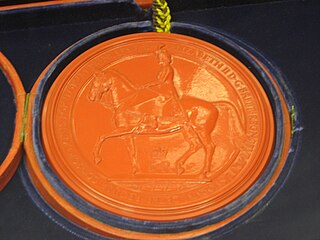
The Great Seal of the Realm is a seal that is used to symbolise the sovereign's approval of state documents. It is also known as the Great Seal of the United Kingdom. To make it, sealing wax is melted in a metal mould or matrix and impressed into a wax figure that is attached by cord or ribbon to documents that the monarch wishes to seal officially. The formal keeper of the seal is the Lord High Chancellor of Great Britain.

A hanaper or hanap, properly a case or basket to contain a "hanap", is a medieval cup or drinking vessel, a goblet with a foot or stem; the term which is still used by antiquaries for medieval stemmed cups. The famous Royal Gold Cup in the British Museum is called a "hanap" in the inventory of Charles VI of France of 1391.
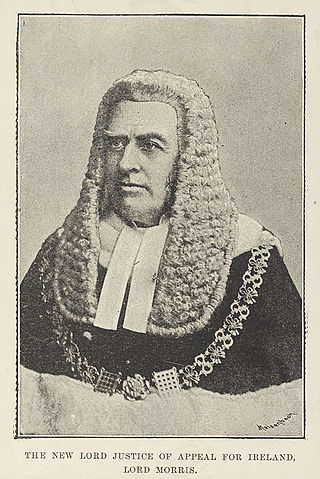
The Attorney-General for Ireland was an Irish and then, from 1801 under the Acts of Union 1800, United Kingdom government office-holder. He was senior in rank to the Solicitor-General for Ireland: both advised the Crown on Irish legal matters. With the establishment of the Irish Free State in 1922, the duties of the Attorney-General and Solicitor-General for Ireland were taken over by the Attorney General of Ireland. The office of Solicitor-General for Ireland was abolished at the same time for reasons of economy. This led to repeated complaints from the first Attorney General of Ireland, Hugh Kennedy, about the "immense volume of work" which he was now forced to deal with single-handedly.
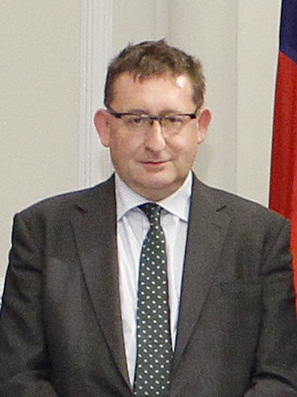
The Clerk of the Parliaments is the chief clerk of the House of Lords in the Parliament of the United Kingdom. The position has existed since at least 1315, and duties include preparing the minutes of Lords proceedings, advising on proper parliamentary procedure and pronouncing royal assent. Many of the Clerk's duties are now fulfilled by his deputies and the Clerk of the Parliaments' Office.

The Clerk of the Crown in Chancery in Great Britain is a senior civil servant who is the head of the Crown Office.
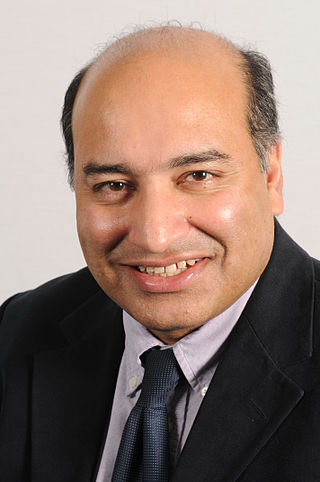
Sir Sumantra "Suma" Chakrabarti is a former British civil servant who served as president of the European Bank for Reconstruction and Development (EBRD) from July 2012 to July 2020. He was previously the highest ranking Indian in Britain's civil service, serving as Permanent Secretary to the Ministry of Justice and Clerk of the Crown in Chancery from late 2007 until 2012.

The Ministry of Justice (MoJ) is a ministerial department of the Government of the United Kingdom. It is headed by the Secretary of State for Justice and Lord Chancellor. Its stated priorities are to reduce re-offending and protect the public, to provide access to justice, to increase confidence in the justice system, and to uphold people's civil liberties. The Secretary of State is the minister responsible to Parliament for the judiciary, the court system, prisons, and probation in England and Wales, with some additional UK-wide responsibilities, e.g., the UK Supreme Court and judicial appointments by the Crown. The department is also responsible for areas of constitutional policy not transferred in 2010 to the Deputy Prime Minister, human rights law, and information rights law across the UK.
Sir Alexander Claud Stuart Allan is a British civil servant who served as chairman of the Joint Intelligence Committee and Head of Intelligence Assessment for Her Majesty's Government between 2007 and 2011.
A chancery or chancellery is a medieval writing office, responsible for the production of official documents. The title of chancellor, for the head of the office, came to be held by important ministers in a number of states, and remains the title of the heads of government in modern Germany and Austria. Chancery hand is a term for various types of handwriting associated with chanceries.
Thomas Willis (1576–1656) was a member of the English landed gentry and Clerk of the Crown in Chancery at the outbreak of the English Civil War, owing to which he suffered the loss of his position and some of his estates. He appears in the 1619 update to the 1575 Visitation of Cambridgeshire, with reference made to his position and ownership of lands at Ashe, Hampshire.

Sir Richard Nicholas Heaton, KCB is a barrister and former senior British civil servant who was the Permanent Secretary to the Ministry of Justice and Clerk of the Crown in Chancery from September 2015 until resigning in August 2020. He had previously served as Cabinet Office Permanent Secretary, and First Parliamentary Counsel. He currently serves as Warden of Robinson College, Cambridge.
The Clerk of the Crown and Hanaper was a civil servant within the Irish Chancery in the Dublin Castle administration. His duties corresponded to the offices of Clerk of the Crown and Clerk of the Hanaper in the English Chancery. Latterly, the office's most important functions were to issue writs of election to the Westminster Parliament, both for the House of Commons and for Irish representative peer in the House of Lords.
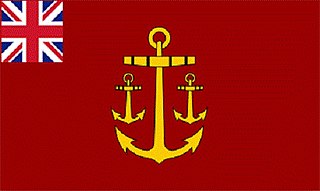
The Clerk of the Acts, originally known as the Keeper of the King's Ports and Galleys, was a civilian officer in the Royal Navy and a principal member of the Navy Board. The office was created by King Charles II in 1660 and succeeded the earlier position of Clerk of the Navy. The Clerk was responsible for the organisation of Navy Office, processing naval contracts and coordinating the administrative and secretarial side of the Navy Board's work. The post lasted until 1796, when its duties were merged with that of the Second Secretary to the Admiralty later known as the Permanent Secretary to the Admiralty.

The Navy Office was the government office responsible for the civil administration of the British Royal Navy from 1576 to 1832. It contained all the members of the Navy Board and various other departments and offices. The day-to-day business of the Navy Office was headed by the Clerk of the Acts from 1660 until 1796. When this position was abolished duties were assumed by separate committees for Accounts, Correspondence, Stores, Transports and Victualling presided over by the Comptroller of the Navy. The Navy Office was one of two government offices that were jointly responsible for directing naval affairs. In 1832 following reforms of the naval service the Navy Office was abolished and its functions and staff taken over by the Admiralty.

The Crown Office, also known as the Crown Office in Chancery, is a section of the Ministry of Justice. It has custody of the Great Seal of the Realm, and has certain administrative functions in connection with the courts and the judicial process, as well as functions relating to the electoral process for House of Commons elections, to the keeping of the Roll of the Peerage, and to the preparation of royal documents such as warrants required to pass under the royal sign-manual, fiats, letters patent, etc. In legal documents, the Crown Office refers to the office of the Clerk of the Crown in Chancery.

The Clerk of the Commonwealth in Chancery was a position during the Interregnum which resembled the Clerk of the Crown.

In the United Kingdom, the Great Officers of State are traditional ministers of the Crown who either inherit their positions or are appointed to exercise certain largely ceremonial functions or to operate as members of the government. Separate Great Officers exist for England and Wales, Scotland, and formerly for Ireland, though some exist for Great Britain and the United Kingdom as a whole.
References
- ↑ Sainty, John Christopher (April 2001). Clerk of the Crown in Chancery. Institute of Historical Research. Archived from the original on 17 July 2018. Retrieved 17 July 2018.
- ↑ "Representation of the People Act 1983 (section 8)". The National Archives . Retrieved 28 March 2021.
- ↑ Mallory, J. R. (1956). "The Clerk of the Crown's Tale". The Canadian Bar Review. XXXIV: 60–68.